初中英语中四个“花费”
初中英语中四个“花费”
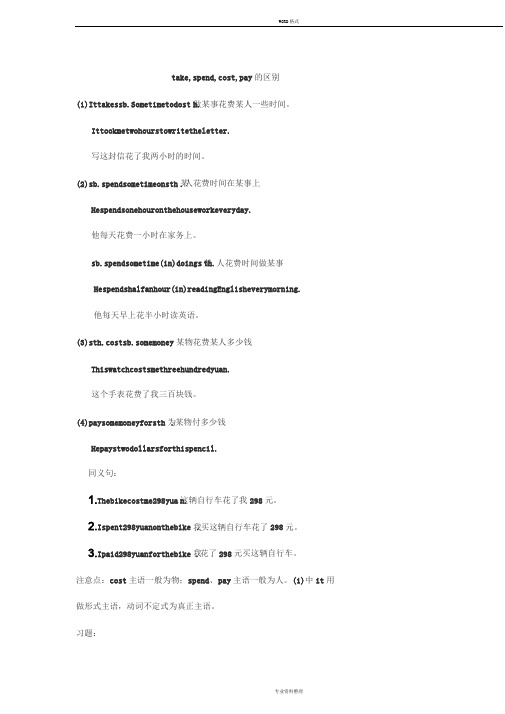
take,spend,cost,pay的区别h.某事花费某人一些时间。
(1)Ittakessb.Sometimetodost做Ittookmetwohourstowritetheletter.写这封信花了我两小时的时间。
.人花费时间在某事上(2)sb.spendsometimeonsth某Hespendsonehouronthehouseworkeveryday.他每天花费一小时在家务上。
t h.人花费时间做某事sb.spendsometime(in)doings某Hespendshalfanhour(in)readingEnglisheverymorning.他每天早上花半小时读英语。
(3)sth.costsb.somemoney某物花费某人多少钱Thiswatchcostsmethreehundredyuan.这个手表花费了我三百块钱。
(4)paysomemoneyforsth为.某物付多少钱Hepaystwodollarsforthispencil.同义句:1.Thebikecostme298yua这n.辆自行车花了我298元。
2.Ispent298yuanonthebike我.买这辆自行车花了298元。
3.Ipaid298yuanforthebike我.花了298元买这辆自行车。
注意点:cost主语一般为物;spend、pay主语一般为人。
(1)中it用做形式主语,动词不定式为真正主语。
习题:4.I'minterestedinanimals,soI_____________everySaturdaya lworkinginananimalhospit。
A.payB.getC.takeD.spend5.Thissciencebook____meagreatamountofmo。
n eyA.tookB.costedD.spent6.他用了多长时间看完了这本书?Howlongdid__________________tofinishreadingthebook? 7.我们花了两个小时才找到他的家。
初中英语人教版七年级下册take,spend,pay,cost的用法

教学设计教学内容:take,spend,pay,cost的用法区别教学目的:通过教学,使学生掌握take,spend,pay,cost作“花费”讲时的用法区别。
了解每个词的意思,用法,固定结构,常用搭配等,从而使所学知识得到熟练灵活地运用。
教学重点:take,spend,pay,cost的用法区别教学过程设计:一.导入二.新授1,take的用法它的常用固定结构是It+take+sb+time+to do sth:做某事花费某人多少时间例:It took me 30 minutes to go to school yesterday.2,spend的用法它的常用结构有:(1)spend time/money on sth:花时间或花钱在……上例:I spend two hours on this math problem.(2)spend time/money (in) doing sth:花时间或花钱做……例:They spend three years (in) building the road.(3)spend money for……:花钱买……..例:His money was spend for kooks.3,pay的用法它的常用结构有:(1)pay(sb)money for sth :付(某人)钱买......I have to pay them 20 pounds for the room each month..(2) pay for sth :花钱买......Now you can pay for my dinner.(3)pay for sb:替某人付钱(4)Pay sb:付钱给某人(5)Pay money back:还钱4,cost的用法它的常用结构有:(1)sth+cost(sb)+money:某物花了(某人)多少钱例:A new computer costs a lot of money.(2)doing sth+ cost+ sb+time:做某事花费某人多少时间例:Remembering these new words cost him a lot of money.三,小结四,练习。
初中英语动词及动词短语考点
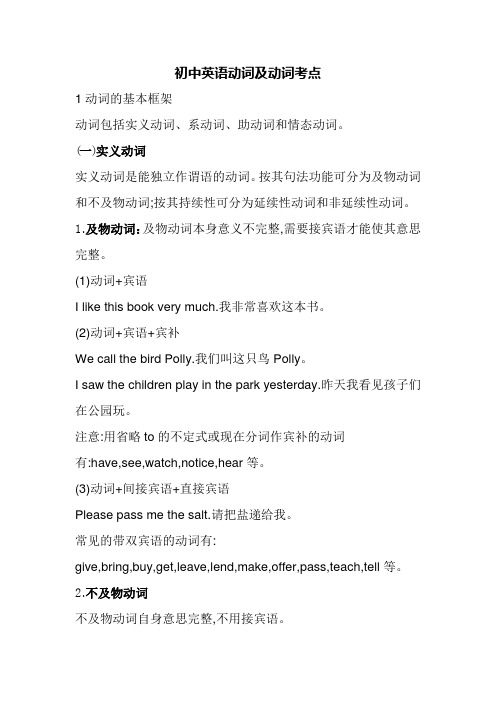
初中英语动词及动词考点1动词的基本框架动词包括实义动词、系动词、助动词和情态动词。
(一)实义动词实义动词是能独立作谓语的动词。
按其句法功能可分为及物动词和不及物动词;按其持续性可分为延续性动词和非延续性动词。
1.及物动词:及物动词本身意义不完整,需要接宾语才能使其意思完整。
(1)动词+宾语I like this book very much.我非常喜欢这本书。
(2)动词+宾语+宾补We call the bird Polly.我们叫这只鸟Polly。
I saw the children play in the park yesterday.昨天我看见孩子们在公园玩。
注意:用省略to的不定式或现在分词作宾补的动词有:have,see,watch,notice,hear等。
(3)动词+间接宾语+直接宾语Please pass me the salt.请把盐递给我。
常见的带双宾语的动词有:give,bring,buy,get,leave,lend,make,offer,pass,teach,tell等。
2.不及物动词不及物动词自身意思完整,不用接宾语。
Horses run fast.马跑得快。
(1)有些动词既可作及物动词又可作不及物动词。
We study English.我们学习英语。
(及物动词)We study hard.我们努力学习。
(不及物动词)(2)有些不及物动词与一些别的词搭配在一起构成动词短语,它的作用相当于一个及物动词。
①动词+介词Listen to the teacher carefully.仔细听老师讲。
此类动词短语后面的宾语无论是名词还是代词,都只能放在介词后面,不能放在动词和介词之间。
②动词+副词+介词Let’s go on with our work!让我们继续我们的工作吧!He gets along well with his classmates.他与他的同学们相处得很好。
初中英语四个“花费”详解及练习题
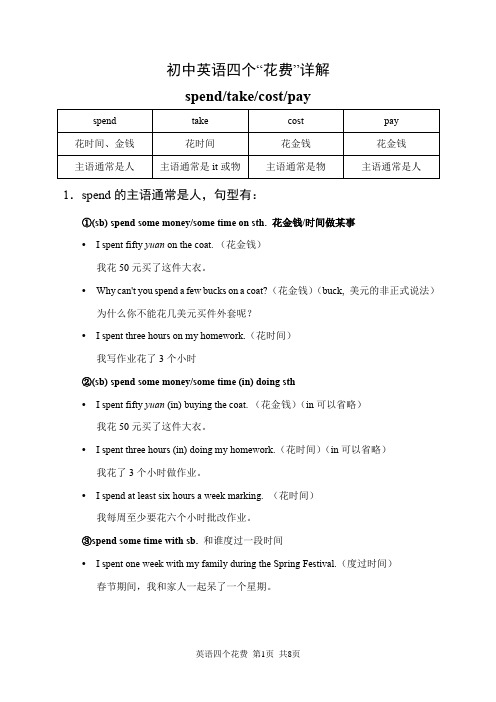
初中英语四个“花费”详解spend/take/cost/pay1.spend的主语通常是人,句型有:①(sb) spend some money/some time on sth. 花金钱/时间做某事•I spent fifty yuan on the coat.(花金钱)我花50元买了这件大衣。
•Why can't you spend a few bucks on a coat?(花金钱)(buck, 美元的非正式说法)为什么你不能花几美元买件外套呢?•I spent three hours on my homework.(花时间)我写作业花了3个小时②(sb) spend some money/some time (in) doing sth•I spent fifty yuan (in) buying the coat.(花金钱)(in可以省略)我花50元买了这件大衣。
•I spent three hours (in) doing my homework.(花时间)(in可以省略)我花了3个小时做作业。
•I spend at least six hours a week marking. (花时间)我每周至少要花六个小时批改作业。
③spend some time with sb. 和谁度过一段时间•I spent one week with my family during the Spring Festival.(度过时间)春节期间,我和家人一起呆了一个星期。
2.take常用于“花费”时间,后面常跟双宾语,其主语通常为形式主语“it”或物。
句型有:①It takes / took / will take sb. + 时间+ to do sth.•It will take me two days to do the work.这项工作将会花去我2天时间。
②Doing sth. / sth. takes sb. some time.•The work will take me two days.这项工作将会花去我2天时间。
初中英语中四个“花费”

take, spe nd, cost, pay 的区别(1) It takes sb. Some time to do sth. 做某事花费某人一些时间。
It took me two hours to write the letter.写这封信花了我两小时的时间。
(2) sb. spe nd some time on sth. 某人花费时间在某事上He spe nds one hour on the housework every day.他每天花费一小时在家务上。
sb. spe nd some time (in) doing sth. 某人花费时间做某事He spe nds half an hour (in) readi ng En glish every morning. 他每天早上花半小时读英语。
(3) sth. cost sb. some money 某物花费某人多少钱This watch costs me three hun dred yua n.这个手表花费了我三百块钱。
(4) pay some money for sth. 为某物付多少钱He pays two dollars for this pen cil.同义句:1. The bike cost me 298 yuan. 这辆自行车花了我298 元。
2. I spent 298 yuan on the bike. 我买这辆自行车花了298 元。
3. I paid 298 yuan for the bike. 我花了298 元买这辆自行车。
注意点:cost主语一般为物;spend、pay主语一般为人。
(1)中it用做形式主语,动词不定式为真正主语。
习题:1. rm interested in animals, so I _________________ every Saturday work ing in an ani mal hospital 。
中考英语丨初中英语句型转换大全

中考英语丨初中英语句型转换大全展开全文一、陈述句与疑问句、祈使句、感叹句间的转换1、陈述句中肯定句变为否定句,大部分是用not来改变谓语结构,但也有借用否定意义的词,如nothing, nobody, none, neither, little, few, never, hardly等,例如:A:T om does well in maths.B:Tom doesn't do in maths.A:He has much to do.B:He has nothing to do.A:All of my classmates like art.B:None of my classmates likes art.2、改为疑问句。
根据上下句的结构和词的减少,来判断变为哪一种形式的疑问句。
例如:A:My brother often has breakfast at school.B: Does your brother often have breakfast at school?A:T om's already weak in English.B:Tom's already weak in English, isn't he ?A:The red light changes every two minutes.B:How often does the red light change?3、改为感叹句。
根据所给的句子结构和单词的词性,来确定使用哪一种感叹句的形式,例如:A:This is an interesting book.B:What an interesting book this is!或 How interesting this book is!二、同义句转换。
根据上句,写出一个意思相同(或相近)的下句,此类形式繁多,内容复杂,涉及面广,归类如下:1、同义词或词组之间的转换。
冀教版初中英语中的四个花费pay-spend-cost-take-用法辨析
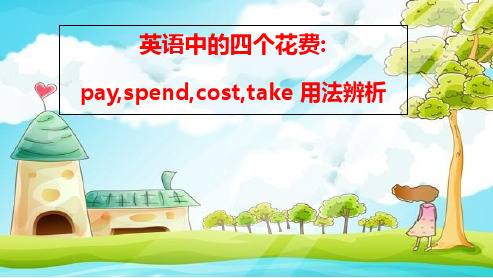
一、主语是人
1. pay: 花费...钱
sb. pay money for sth. 付钱...买… eg:Tom pays 15 yuan for the bike.
2.spend: 花费钱或时间
① sb. spend time /money on sth. 在……上花费时间/金钱。
冀教版初中英语中的四个花费冀教版初中英语中的四个花费paypayspendspendcostcosttaketake用法辨析用法辨析payspendcosttakepayspendcosttake一主语是人sb
英语中的四个花费:
pay,spend,cost,take 用法辨析
pay,spend,cost,take都可以做“花费”讲, 但用法不一样。
eg. Lily spent ten yuan on this pen.
② sb. 金钱做某事。
eg. Lily spent ten yuan (in) buying this pen.
二、主语是物 1、cost: 花费钱
3. 在“替换为”下拉列表中选择替换字体。 4. 点击“替换”按钮,完成。
PPT放映设 置
PPT放映场合不同,放映的要求也不同,下面将例举几种常用的放映设置方式。 让PPT停止自动播放 1. 单击”幻灯片放映”选项卡,去除“使用计时”选项即可。
让PPT进行循环播放 1.单击”幻灯片放映”选项卡中的“设置幻灯片放映”,在弹出对话框中勾选“循 环放 映,按ESC键终止”。
Sth. cost sm.
B A
The more time you spend in learning, the better you will be.
《常考题》初中英语九年级全册Unit 11基础练习(含答案解析)

一、选择题1.—You have made great progress on your study.—Thank you. I believe ________ you work, the better grades you will get.A.the more careless B.the more careful C.the worse D.the harder D解析:D【详解】句意:——你在学习上取得了很大的进步。
——谢谢。
我相信你学习越努力,你的成绩就会越好。
考查副词比较级。
more careless更不小心的;more careful更加小心的;worse更糟糕;harder更努力。
根据题干中“I believe ________ you work, the better grades you will get.”,结合选项可知要用“the+比较级,the+比较级”表示“越……就越……”。
修饰work要用副词的比较级,排除AB;再由常识可得知学习越努力成绩就越好,用the harder符合题意。
故选D。
2.His cousin would rather ______ TV at home than ______.A.watching; going B.watch; going C.watch; go D.to watch; go C解析:C【解析】【详解】句意:他表弟宁愿在家看电视也不愿去。
本考查固定句型。
句型would rather do sth. than do sth. :宁愿做某事不愿做某事,宁愿做某事也不要做某事。
结合句意可知填watch; go ;选C。
【点睛】would rather do sth. than do sth.也可说 would do sth. rather than do sth.,意思是“宁愿做某事不愿做某事,宁愿做某事也不要做某事。
”例如,I would stay at home rather than go out today.= I would rather stay at home than go out today.3.They are not twins, but look similar and they have something ______ common.A.for B.with C.in D.on C解析:C【详解】句意:他们不是双胞胎,但长得很像,而且有一些共同点。
【推荐下载】决胜中考词汇:四个“花费”的辨析
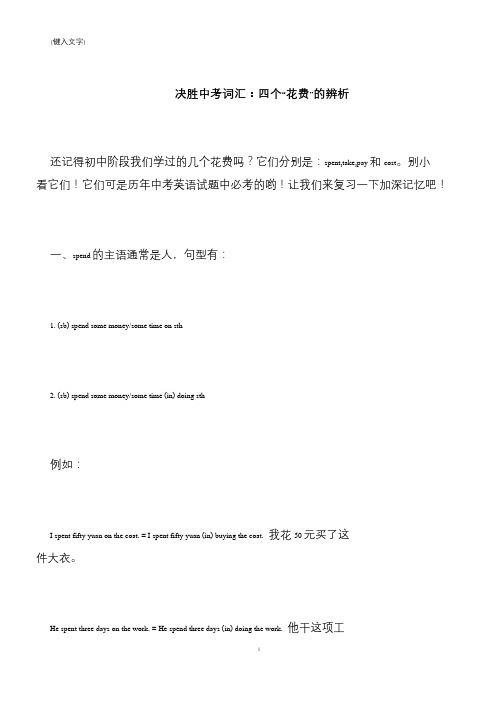
[键入文字]
作用了3天。
3.spendmoneyforsth.花钱买
例如:Hismoneywasspentforbooks.他的钱用来买书了。
二、take常用于占用、花费时间,后面常跟双宾语,其主语通常为形式主语it或
物。句型有:
1.Ittakes/tooksb.sometimetodosth
例如:Itwilltakemetwodaystodothework.这项工作将会花去我2天时间。
2.(sb)spendsomemoney/sometime(in)doingsth
例如:
Ispentfiftyyuanonthecoat.=Ispentfiftyyuan(in)buyingthecoat.我花50元买了这
件大衣。
Hespentthreedaysonthework.=Hespendthreedays(in)doingthework.他干这项工
注意:cost的过去式及过去分词都是cost,并且不能用于被动句。
4
[键入文字]
5
例如:Anewcomputercostsalotofmoney.买一台新电脑要花一大笔钱。
2.(doing)sth.costs(sb.)+time某物(做某事)花了(某人)多少时间
例如:Rememberingthesenewwordscosthimalotoftime.他花了大量时间才记住了
这些单词。
的房租。
3.paymoneyback还钱
3
[键入文字]
例如:MayIborrow12yuanfromyou?I'llpayitbacknextweek.你能借给我12
块钱吗?下周还你。
2020广东省中考——英语完形填空题型解题方法和技巧讲解(附练习试题)
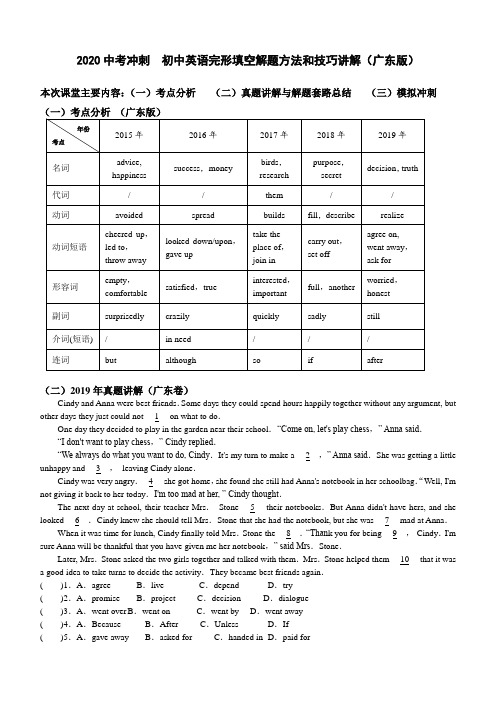
2020中考冲刺初中英语完形填空解题方法和技巧讲解(广东版)本次课堂主要内容:(一)考点分析(二)真题讲解与解题套路总结(三)模拟冲刺(二)2019年真题讲解(广东卷)Cindy and Anna were best friends.Some days they could spend hours happily together without any argument, but other days they just could not __1__ on what to do.One day they decided to play in the garden near their school.“Come on, let's play chess,” Anna said.“I don't want to play chess,” Cindy replied.“We always do what you want to do, Cindy.It's my turn to make a __2__,” Anna said.She was getting a little unhappy and __3__,leaving Cindy alone.Cindy was very angry.__4__ she got home,she found she still had Anna's notebook in her schoolbag.“Well, I'm not giving it back to her today.I'm too mad at her, ” Cindy thought.The next day at school, their teacher Mrs.Stone __5__ their notebooks.But Anna didn't have hers, and she looked __6__.Cindy knew she should tell Mrs.Stone that she had the notebook, but she was __7__ mad at Anna.When it was time for lunch, Cindy finally told Mrs.Stone the __8__.“Than k you for being __9__,Cindy.I'm sure Anna will be thankful that you have given me her notebook,” said Mrs.Stone.Later, Mrs.Stone asked the two girls together and talked with them.Mrs.Stone helped them __10__ that it was a good idea to take turns to decide the activity.They became best friends again.()1.A.agree B.live C.depend D.try()2.A.promise B.project C.decision D.dialogue()3.A.went over B.went on C.went by D.went away()4.A.Because B.After C.Unless D.If()6.A.worried B.normal C.proud D.relaxed()7.A.still B.never C.usually D.almost()8.A.chance B.method C.truth D.rule()9.A.patient B.honest C.active D.quiet()10.A.describe B.explain C.guess D.realize【文章大意】这是一篇记叙文,主要叙述Cindy与Anna两位好朋友经常就一些事情争吵,一位老师通过教导使她们意识到轮流做决定是一个好主意,她们再次成为好朋友的故事。
初中英语:take、spend、pay、cost用法详解.doc

初中英语:take、spend、pay、cost用法详解1. take 它通常用it作形式主语,而真正的主语放在句子后面。
句型: (1)How long does it take sb. to do sth.?做某事花费某人多长时间呢?(2)It takes sb. some time to do sth. 做某事花费了某人多长时间。
eg:- How long does it take you to get to school?到学校话费了你多长时间呢?(it为形式主语,真正主语为get to school)-Half an hour.半小时。
It takes my father thirty minutes to finish the work.完成这项工作话费了我爸爸半小时的时间。
2. spend 通常是人做主语,后常跟时间,金钱。
句型: (1) sb. spend(s) time/money on sth. (主语为单三时,用spends)某人在某方面花费时间/金钱。
eg: My English teacher often spends two hours on our homework every day.每天我们的英语老师通常在我们的作业上话费两小时的时间。
(2) sb. spend(s) time/money (in) doing sth. 某人花时间/金钱做某事。
(主语为单三时为spends,in可省略)eg: I spend ten yuan in.buying this book.我买这本书花了10元。
这两个句型可同义句转换。
每周我花三小时练习英语口语。
eg: I spend three hours on spoken English.= I spend three hours practicing spoken English.3. pay 也是用人做主语,句型: sb. pay(s) some money for sth. 某人为某物付了多少钱。
初中英语《四个”花费“用法》
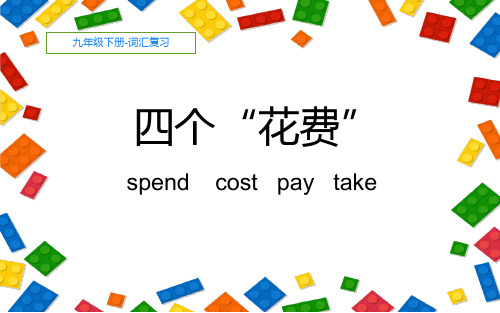
4)The policeman saves the children at the _____ coofshtis life.
(read) English every day. 8)How long_d_o_e_s____it __ta_k__e___(take) you ____to__r_e_a_d_(read)English every day? 9)_D_o_e_s__it__t_a_k_e__(take)you 20 minutes __t_o_r_e_a_d_(read) English every day?
Eg: 这件新衬衫花了张先生200元。
The new shirt cost Mr Wang 200 yuan. 新电脑多少钱? How much does the new computer cost?
• cost 做n. 和介词of连用,“……的费用”
e.g. _T_h_e__co_s_t_o_f_t_h_e_o_l_d_c_a_r_ is 10,000 yuan. 这辆旧 车要花10,000元。
It usually takes me 30 minutes _______my bedroom.= I spend 30 minutes cleaning my bedroom.
知识讲解
pay 花费,付钱
句型 sb+pay+ some money + to do/ for sth. 只能表示付钱,不能用于时间的花费
课堂小结
初中英语2000个固定短语搭配
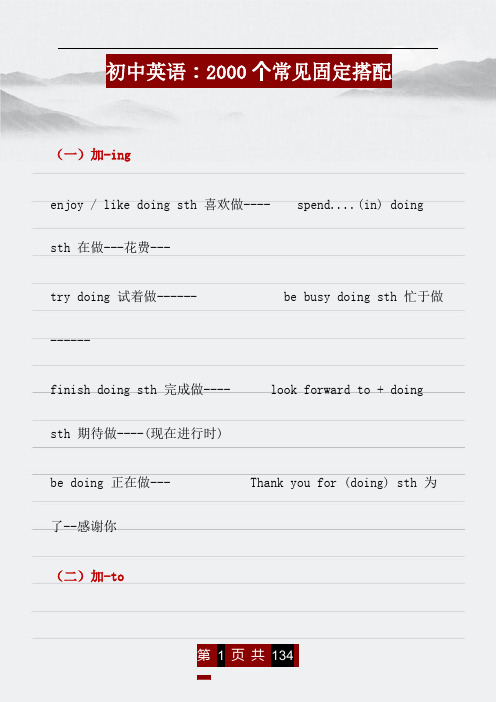
2000(一)加-ingenjoy / like doing sth 喜欢做---- spend....(in) doing sth 在做---花费---try doing 试着做------ be busy doing sth 忙于做------finish doing sth 完成做---- look forward to + doing sth 期待做----(现在进行时)be doing 正在做--- Thank you for (doing) sth 为了--感谢你(二)加-todecide to do sth 决定去做----- ask (sb)to do 要求(某人)去做----It’s+adj +to do sth . 做---(怎么样) would like / want to do 想要做-----It takes sb sometime to do sth在做----花费----(三)加原形let / make sb do sth 让某人做某事 be going to / will do sth (一般将来时态)(四)加-to 或-ing意思不同forget doing 忘记做过了-----(已做) remember doing记得做过了-----(已做)forget to do 忘记去做------(还没做) remember to do记得去做------(还没做)(五)加-to 或-ing意思相同begin / start to do sth = begin / start doing sth开始做------(六) (A)动词+ 介词agree with同意....的意见(想法);符合 help ... with ...帮助(某人)做(某事)listen to听... get to到达.... fall off (从......)掉下base on以....(为)根据 knock at /on敲(门、窗) laugh at嘲笑learn.. from 向...学习 live on继续存在;靠...生活look after照顾,照看 look at看;观看 look for寻找look like看起来像 pay for (sth.)付钱;支付point at指示;指向point to指向.... prefer to ...宁愿(选择);更喜欢quarrel with (和某人)吵架 regard...as ...把....当作....;当作 stop...from阻止.....做..... talk about说话;谈话;谈论talk with与......交谈 think about考虑think of认为;想起B)动词+ 副词ask for请求;询问 carry on坚持下去;继续下去 cut down砍倒clean up清除;收拾干净 come down下来;落 come along来;随同come in进来 come on来吧;跟着来;赶快come over过来;顺便来访 come out出来;出现;(花)开;发(芽)drop off放下(某物);下车 eat up吃光;吃完fall behind落在......后面;输给别人 fall down跌倒;从......落下find out查出(真相) get back回来;取回get down下来;落下;把......取下来 get off下来;从......下来get on上(车) get up起床 give up放弃 go on 继续 go out出去 go over过一遍;仔细检查 grow up长大;成长hand in交上来 hurry up赶快 hold on (口语)等一等;(打电话时)不挂断 look out留神;注意 look over (仔细)检查 look up向上看;抬头看pass on传递;转移到.... pick up拾起;捡起 put away放好;把....收起来put on穿上;戴上;(戏剧等)上演;放(唱片)等 put down把(某物)放下来 put up挂起;举起run away流失;逃跑;逃走 rush out冲出去set off出发;动身;启程 send up发射;把......往上送shut down把......关上sit down坐下 slow down减缓;减速 take off脱掉(衣服)take out取出 throw about乱丢;抛撒 trip over (被......)绊倒try on试穿(衣服、鞋等);试戴(帽子等) try out试验;尝试turn down关小;调低 turn on打开(电灯、收音机、煤气、自来水)等turn off关(电灯、收音机、煤气、自来水等) turn over (使)翻过来wake up醒来 wear out把......穿旧;磨坏 work out算出;制订出 write down 写下....C) be + 形容词+ 介词be angry with对(某人)发脾气 be interested in 对......感兴趣be able to能;会 be afraid of害怕 be amazed at 对......感到惊讶be excited about对......感到兴奋 be filled with 用......充满 be full of充满......的 be good at =do well in在....方面做得好;善于be late for迟到 be made in在......生产或制造 be made of由....组成;由....be pleased with对......感到满意 be proud of以......自豪/高兴 be used for用于D)动词+ 名词/ 代词beg one´s pardon请原谅;对不起 do morning exercises做早操do one´s homework做作业 enjoy oneself =have a good time过得快乐;玩得愉快 give a concert开音乐会 go boating去划船 go fishing去钓鱼go hiking去徒步旅行 go skating去滑冰 go shopping (去)买东西have a cold (患)感冒 have a cough (患)咳嗽 have a headache (患)头痛have a try尝试;努力 have a look看一看 have a rest休息have a seat (= take a seat ) 就坐;坐下 have sports进行体育活动have supper吃晚餐 hear of听说 hold a sports meeting举行运动会make a decision作出决定 make a mistake犯错误 make a noise吵闹make faces做鬼脸 make friends交朋友 make money赚钱take one´s place坐某人的座位;代替某人的职务teach oneself (=learn by oneself ) 自学 watch TV看电视take photos照相 take time花费(时间) take turns轮流E)动词+ 名词/ 代词/ 副词+ 介词catch up with赶上 come up with找到;提出(答案、解决办法等)get on well with与......相处融洽 give birth to生(孩子) help yourself / yourselves to自取;随便吃 make room for 给.....腾出地方play a joke on戏弄人;对人恶作剧 speak highly of称赞say good bye to告别;告辞 take an active part in积极参加take care of照顾;照料;注意F)其他类型be awake醒着的 be born出生 be busy doing 忙着做come true实现 do one´s best尽最大努力 fall asleep 睡觉;入睡go home回家 go on doing (sth.)继续做某事;尽力 get married结婚get together相聚 go straight along 沿着...一直往前走had better (do)最好(做...) keep doing sth.一直做某事 make sure确保;确认;查明make up one´s mind下决心1 (see 、hear 、notice 、find 、feel 、listen to 、 look at 感官动词)+do eg:I like watching monkeys jump2 (比较级 and 比较级)表示越来越怎么样3 a piece of cake =easy 小菜一碟(容易)4 agree with sb 赞成某人5 all kinds of 各种各样 a kind of 一样6 all over the world = the whole world 整个世界7 along with同…一道,伴随…eg : I will go along with you我将和你一起去The students planted trees along with their teachers. 学生同老师们一起种树8 as soon as 一怎么样就怎么样 9 as you can see 你是知道的10 ask for ……求助向…要…(直接接想要的东西) eg : ask you for my book11 ask sb for sth 向某人要什么12 ask sb to do sth 询问某人某事 ask sb not to do 叫某人不要做某事13 at the age of 在……岁时 eg:I am sixteen. =I am at the age of sixteen.14 at the beginning of …………的起初;……的开始15 at the end of +地点/+时间最后;尽头;末尾 eg : At the end of the day.16 at this time of year 在每年的这个时候17 be /feel confident of sth /that clause +从句感觉/对什么有信心,自信eg : I am / feel confident of my spoken English.I feel that I can pass the test.18. be + doing 表:1 现在进行时 2 将来时I am watching now. I am going to the zoo tomorrow.19 be able to (+ v 原) = can (+ v 原)能够……eg : She is able to sing She can sing20 be able to do sth 能够干什么 eg :She is able to sing.21 be afraid to do /of sth 恐惧,害怕……eg : I'm afraid to go out at night. I'm afraid of dog.22 be allowed to do 被允许做什么eg: I'm allowed to watch TV.我被允许看电视。
初中英语人教版八年级下册cost,spend,take的区别
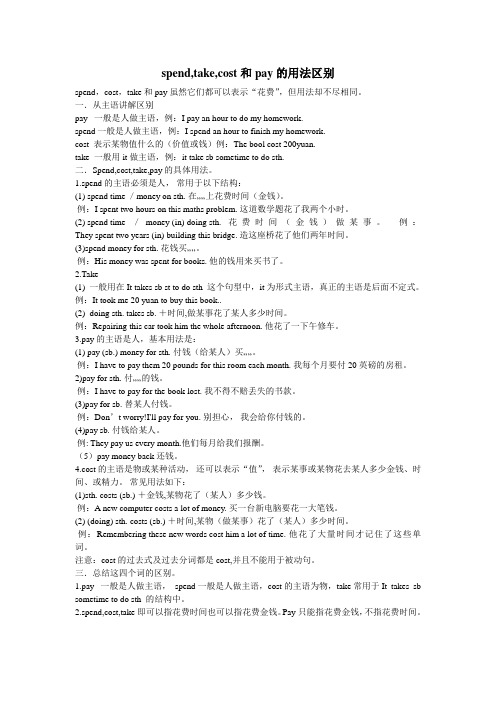
spend,take,cost和pay的用法区别spend,cost,take和pay虽然它们都可以表示“花费”,但用法却不尽相同。
一.从主语讲解区别pay 一般是人做主语,例:I pay an hour to do my homework.spend 一般是人做主语,例:I spend an hour to finish my homework.cost 表示某物值什么的(价值或钱)例:The bool cost 200yuan.take 一般用it做主语,例:it take sb sometime to do sth.二.Spend,cost,take,pay的具体用法。
1.spend的主语必须是人,常用于以下结构:(1) spend time /money on sth. 在……上花费时间(金钱)。
例:I spent two hours on this maths problem. 这道数学题花了我两个小时。
(2) spend time /money (in) doing sth. 花费时间(金钱)做某事。
例:They spent two years (in) building this bridge. 造这座桥花了他们两年时间。
(3)spend money for sth. 花钱买……。
例:His money was spent for books. 他的钱用来买书了。
2.Take(1) 一般用在It takes sb st to do sth 这个句型中,it为形式主语,真正的主语是后面不定式。
例:It took me 20 yuan to buy this book..(2) doing sth. takes sb. +时间,做某事花了某人多少时间。
例:Repairing this car took him the whole afternoon. 他花了一下午修车。
3.pay的主语是人,基本用法是:(1) pay (sb.) money for sth. 付钱(给某人)买……。
初中英语易混淆知识点

初中英语易混淆知识点篇一:初中易混淆知识点讲解初中易混淆知识点讲解一、spend,cost,take和pay都可以表示“花费”,但用法却不尽相同It takes(took) sb. +金钱或时间 to do sthSb. spend(spent) +金钱或时间 on sthSb. spend(spent) +金钱或时间 (in) doing sthSth cost(cost) + 金钱Sb. pay(paid)+ 金钱 for sthspend的主语必须是人,常用于以下结构:(1) spend time /money on sth. 在??上花费时间(金钱)。
例:I spent two hours on this maths problem. 这道数学题花了我两个小时。
(2) spend time / money (in) doing sth. 花费时间(金钱)做某事。
例:They spent two years (in) building this bridge. 造这座桥花了他们两年时间。
(3)spend money for sth. 花钱买??。
例:His money was spent for books. 他的钱用来买书了。
cost的主语是物或某种活动,还可以表示“值”,常见用法如下:(1)sth. costs (sb.) +金钱, 某物花了(某人)多少钱。
例:A new puter costs a lot of money. 买一台新电脑要花一大笔钱。
(2) (doing) sth. costs (sb.) +时间,某物(做某事)花了(某人)多少时间。
例:Remembering these new words cost him a lot of time. 他花了大量时间才记住了这些单词。
注意:cost的过去式及过去分词都是cost,并且不能用于被动句。
take后面常跟双宾语,常见用法有以下几种:(1) It takes sb. +时间+to do sth. 做某事花了某人多少时间。
初中英语《四个”花费“用法》

课堂小结
Summary
1. spend 时间和钱都可用,pay和cost只 能用于钱,take只能花时间。 2. spend, pay主语必须是人,cost主语是 物,take只能用it takes…句型。 3. spend后加doing, 特别容易出错。
Eg: The young pay much money for the computer games. 年轻人在电脑游戏上花很多钱。
I’ll treat you, so I’ll pay the bill. 我今天请客,所以我买单。
课堂练习用cost,take,spend, pay填空。
1) It __t_a_k_e_s_ me two hours to do my homework every day.
2) That new car will _c_o_s_t ___ them lots of money. 3) He _s_p_e_n_d_s a lot of time reading books.
4)The policeman saves the children at the _____ coofshtis life.
It usually takes me 30 minutes _______my bedroom.= I spend 30 minutes cleaning my bedroom.
知识讲解
pay 花费,付钱
句型 sb+pay+ some money + to do/ for sth. 只能表示付钱,不能用于时间的花费
(read) English every day. 8)How long_d_o_e_s____it __ta_k__e___(take) you ____to__r_e_a_d_(read)English every day? 9)_D_o_e_s__it__t_a_k_e__(take)you 20 minutes __t_o_r_e_a_d_(read) English every day?
四个花费cost spend take pay的区别 初中八年级上册英语教案教学设计课后反思

教师姓名王芳单位名称石河子第九中学填写时间2020.8月26日学科英语年级/册八年级教材版本人教版课题名称四个“花费“的区别难点名称四个“花费“的区别难点分析从知识角度分析为什么难这4个词是同意不同词,仅仅背诵并且翻译记忆是不够的,汉译无法辅助学生做题。
四个花费的区别:cost通常指花费金钱,主语为某物或某事;spend的主语是人,宾语通常是时间、金钱等。
常用结构:spend…(in)doing sth.和spend…on sth.。
take通常指花费时间,常用it作形式主语,真正的主语为动词不定式。
常用结构:It takes /took sb. some time to do sth;pay通常指花费金钱,主语是人 常和介词for搭配使用。
难点教学方法1.情境代入感知法。
读并且理解例句。
2.PPT展示法。
3.做题步骤师生共同总结:1清楚四个花费的搭配,找到题中给出的搭配,确定使用 哪个花费,判断时态教学过程导入对于已学单词cost ,spend ,take,pay的用法,利用一个情境对话,让学生理解并且区分四个词汇的用法。
T:Hi,everyone,long time no see,how is everything going?S:Great,OK,just so so ......How about you?T:I have a good time ,because It only took me 10 minutes to get to school and I bought a new computer yesterday.It cost me 4000 yuan,In other word,I pay 4000 yuan for the computer.It's very useful for me.I usually spend one hour(in)surfing the Internet to see what's going on around the world.And I will also spend another two hours on my homework.It helps me do my homework more quickly than before.知识讲解(难点突破)一: cost的用法---通常指花费金钱,主语为某物或某事。
四个花费单词

表示花费四个单词
在英语中,表示“花费”的常见单词有四个:cost、spend、take 和pay。
以下是它们各自的使用方法和含义:
1. Cost:这个单词通常用于描述某物的价格或价值,也可以用来表示为获得某物而付出的代价。
例如,“The book cost me $10.”(这本书花了我10美元。
)
2. Spend:这个单词用于描述花费时间或金钱做某事。
例如,“I spent the whole day on the project.”(我在这个项目上花了一整天的时间。
)
3. Take:这个单词通常用于描述完成某事所需的时间或花费的精力。
例如,“It took me three hours to finish the report.”(我花了三个小时完成报告。
)
4. Pay:这个单词通常用于描述支付金钱的行为,例如工资、费用或账单。
例如,“I pay my bills on time every month.”(我每个月按时支付账单。
)
请注意,这些单词在使用上可能存在细微差别,具体使用哪个单词取决于语境和表达方式。
- 1、下载文档前请自行甄别文档内容的完整性,平台不提供额外的编辑、内容补充、找答案等附加服务。
- 2、"仅部分预览"的文档,不可在线预览部分如存在完整性等问题,可反馈申请退款(可完整预览的文档不适用该条件!)。
- 3、如文档侵犯您的权益,请联系客服反馈,我们会尽快为您处理(人工客服工作时间:9:00-18:30)。
take, spend, cost, pay的区别
(1)It takes sb. Some time to do sth.做某事花费某人一些时间。
It took me two hours to write the letter.
写这封信花了我两小时的时间。
(2)sb. spend some time on sth.某人花费时间在某事上
He spends one hour on the housework every day.
他每天花费一小时在家务上。
sb. spend some time (in) doing sth.某人花费时间做某事
He spends half an hour (in) reading English every morning.
他每天早上花半小时读英语。
(3)sth. cost sb. some money某物花费某人多少钱
This watch costs me three hundred yuan.
这个手表花费了我三百块钱。
(4)pay some money for sth.为某物付多少钱
He pays two dollars for this pencil.
同义句:
1. The bike cost me 298 yuan.这辆自行车花了我298元。
2. I spent 298 yuan on the bike.我买这辆自行车花了298元。
3. I paid 298 yuan for the bike.我花了298元买这辆自行车。
注意点:cost主语一般为物;spend、pay主语一般为人。
(1)中it用做形式主语,动词不定式为真正主语。
习题:
1.I'minterestedinanimals,soI_____________everySaturdayworking in an animal hospital。
A. pay
B. get
C. take
D. spend
2.This science book ____ me a great amount of money。
A. took
B. cost
C. used
D. spent
3.他用了多长时间看完了这本书?
How long did _________ _________to finish reading the book?
4.我们花了两个小时才找到他的家。
_________ _________ two hours _________ _________ his home.
5.她在服装上花了很多钱。
She _______ lots of money_______ dresses.
6.我每天晚饭后花半个小时看中央电视台新闻。
It ________ ________ half an hour ________ ________ the CCTV Newsafter supper every day.
7.昨天我花了两个钟头的时间完成这项工作。
________ ________ me two hours ________ ________ the workyesterday.
8.我花了2000多元买这手机,这个月的午餐就得吃面包。
The mobile phone________ ________ more than 2000 yuan. I have tohave bread ________ ________ this month.
9.别担心,我会给你付钱的。
Don’t worry! I'll ___________ for you.。
